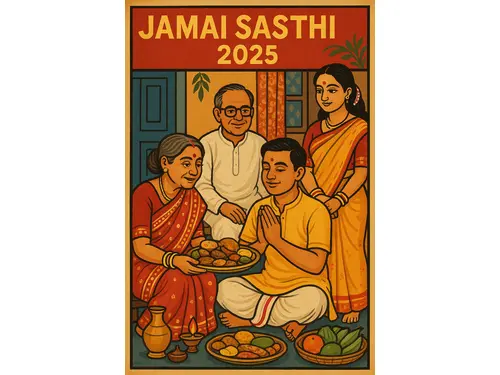
Jamai Sasthi 2025: Celebrating the Cherished Bond Between Son-in-Law and In-Laws
By Meenakshi G on May 6, 2025
Jamai Sasthi 2025, a cherished Bengali festival, epitomizes the deep-rooted cultural ethos of honoring familial bonds, particularly the unique relationship between a son-in-law (jamai) and his in-laws. In 2025, this vibrant celebration falls on Sunday, June 1st, marking a day filled with rituals, delectable feasts, and heartfelt blessings.
Understanding Jamai Sasthi: Origins and Significance
Jamai Sasthi is observed on the sixth day (Shasthi) of the waxing moon (Shukla Paksha) in the Bengali month of Joishtho, corresponding to May or June in the Gregorian calendar. The festival’s roots trace back to ancient mythology and societal traditions, evolving to honor the son-in-law’s role within the family.
Mythological Roots
The festival is associated with Goddess Shasthi, revered as the protector of children and the deity of fertility and family welfare. A popular legend tells of a housewife who falsely accused a cat, the vahana (vehicle) of Goddess Shasthi, of stealing food. In response, the goddess punished her by taking away her child. The remorseful mother sought forgiveness through prayers and rituals, leading to the child’s return and the establishment of Shasthi Puja. Over time, this ritual evolved into Jamai Sasthi, celebrating not only family bonds but also the son-in-law’s role within the family.
Cultural Evolution
In traditional Bengali society, married daughters often had limited opportunities to visit their parental homes. Jamai Sasthi emerged as a means to reunite families, with married daughters and their husbands invited home for grand celebrations, thereby strengthening familial ties.
Jamai Sasthi 2025: Date and Observance
In 2025, Jamai Sasthi will be celebrated on Sunday, June 1st. Families across West Bengal and among Bengali communities worldwide will observe this day with traditional rituals and festive gatherings.
Rituals and Traditions
Jamai Sasthi is marked by a series of rituals that underscore respect, blessings, and the joy of togetherness.
1. Inviting the Son-in-Law
The mother-in-law extends a warm invitation to her son-in-law and daughter, welcoming them into her home with affection and ceremonial gestures.
2. Morning Puja to Goddess Shasthi
The day begins with the mother-in-law performing a puja dedicated to Goddess Shasthi, seeking blessings for the prosperity and well-being of her daughter and son-in-law. Offerings typically include rice, durbo (grass), and five types of fruits.
3. Blessing the Son-in-Law
Upon arrival, the son-in-law is greeted with traditional rituals:
-
Tying of the ‘Shasthi Suto’: A yellow thread, dyed with turmeric, is tied around the son-in-law’s wrist, symbolizing protection and blessings from Goddess Shasthi.
-
Application of ‘Phota’: A small mark made with curd is applied to the forehead, signifying purity and auspiciousness.
-
Offering of Fruits and Grains: A plate containing six fruits is touched to the son-in-law’s forehead, and grains along with durbo grass are sprinkled over him as a blessing.
4. Grand Feast
A highlight of Jamai Sasthi is the sumptuous feast prepared by the mother-in-law, featuring an array of traditional Bengali delicacies. The menu often includes:
-
Shukto: A bitter-sweet vegetable medley, served with Polao prepared with gawa Ghee, or Rice (Gobindobhog rice), accompanied with aromatic Gondhoraj lebu.
-
Luchi and Alur Dom: Deep-fried flatbreads served with spicy potato curry.
-
Fish Delicacies: Dishes like ‘Ilish Bhapa’ (steamed hilsa in mustard sauce) and ‘Chingri Malai Curry’ (prawns in coconut milk).
-
Mutton Kosha: Slow-cooked spicy mutton curry.
-
Sweets: Traditional desserts such as ‘Mishti Doi’ (sweetened yogurt), Mihidana, Payesh, ‘Rasgulla’, and ‘Sandesh’. And followed by Bengali Kolkata Pan!
The son-in-law is treated with utmost care, often encouraged to indulge heartily, symbolizing the family’s affection and hospitality.
5. Exchange of Gifts
As a token of love and respect, the mother-in-law presents gifts to her son-in-law, which may include clothing, accessories, or even gold ornaments, depending on family traditions.
Contemporary Celebrations
While rooted in tradition, Jamai Sasthi has adapted to modern times. Urban families may opt for restaurant outings or home deliveries, yet the essence of honoring the son-in-law remains unchanged. Social media platforms often see a flurry of posts celebrating the day, with families sharing pictures of their festivities and expressing their affection for their sons-in-law.
Conclusion
Jamai Sasthi stands as a testament to the enduring values of respect, love, and familial bonds in Bengali culture. Beyond the rituals and feasts, it is a day that reinforces the importance of relationships and the joy of togetherness. As families come together to celebrate on June 1, 2025, Jamai Sasthi will once again highlight the warmth.